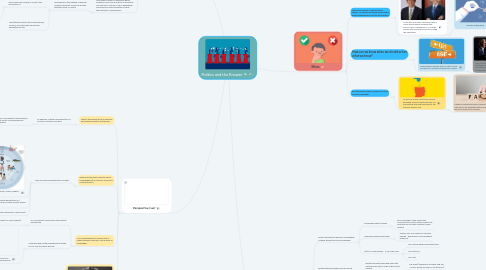
1. Methods and tools (Amanda)
1.1. What assumptions underlie the methods of inquiry used in these themes/areas of knowledge
1.1.1. There is always bias
1.1.1.1. There is always assumptions of the information
1.1.1.1.1. - Surveys - Polls - Statistics - Data analytics - Policy documents - Reports - Speeches - Observation
1.1.1.2. The information may have been pre chosen or altered
1.2. How important are material tools in the production and acquisition of knowledge
1.2.1. “Political spin"
1.2.1.1. Refers to passing on a biased message in order to maintain control of a situation.” .
1.2.1.1.1. Used in politics, companies
1.3. Does what is seen to constitute "good" evidence" vary from discipline to discipline and culture to culture? How is knowledge produced and communicated in these themes/areas of knowledge?
1.3.1. Depending on the method of gaining evidence different forms will provide different levels of results
1.3.1.1. Since we live in “knowledge societies,” so there is endless amounts of knowledge that can be easily shared. However we don’t know how reliable or correct this information is.
1.3.1.1.1. The assumptions of the strategies used and the evidence behind it, is dependent on the perspective of those who have power.
1.3.1.2. "Quantitative results may be provided by surveys, and interviews will provide qualitative results”
2. Perspective (val)
2.1. What is the significance of historical developments within this theme?
2.1.1. an example of political perspectives in practice: epistemic injustice
2.1.1.1. it is a form of unfairness/ discrimination related to issues of knowledge and understanding
2.1.1.1.1. eg: holding prejusdices about a speaker based on gender or social background
2.2. what does this theme identify about knowledge that is rooted in social and cultural groups?
2.2.1. how are political perspectives formed?
2.2.1.1. Though family, community, culture, religion, those is power
2.2.1.1.1. people in power influencing political perspectives: whites during apartheid in South Africa until 1970s)
2.2.1.2. often your political perspective is a reflection of how you think society should function.
2.2.1.3. your perspective should also reflect facts
2.2.1.3.1. necessary to question your own political perspective
2.3. Is an understanding of perspective of others knowers essential in the pursuit of knowledge?
2.3.1. it is important to know your own political perspective
2.3.1.1. as our perspective impact so many aspects of life
2.3.1.1.1. being aware of our own biases
2.3.2. understanding multiple perspectives allows you to "see the whole picture"
2.3.2.1. once you see the whole picture your decision making can be more informed
2.4. are some types of knowledge less open to interpretation than others?
2.4.1. perspectives are not a "wrong way to look at things" and a "right way to look at things" (from video)
2.4.2. just a different way to see things
3. Ethics
3.1. Should the pursuit of knowledge in politics be subject to ethical constraints? What responsibilities rest on the knower?
3.1.1. Politicians and other authorities have a moral responsibility because their actions have consequences. Societies believe that politicians should be doing the right thing
3.1.1.1. Genetic engineering
3.1.1.1.1. Pros: Has the prospect of curing genetic diseases.
3.1.1.1.2. Cons: 1. Ethical issues which we do not yet know how to resolve such as gene editing 2. We do not know enough about the consequences 3. we do not know where to draw the lines regarding how much ‘manipulation’ of life is ethical
3.2. How can we know when we should act on what we know?
3.2.1. When people decides who to vote for they are likely to consider the politician's ethics.
3.2.1.1. They may base their allegiance on a belief that they can trust the candidate for his or her ethical stances and values and in view of their personal and political history.
3.2.1.1.1. A political action is ethical if it normally would be ethical. e.g. if you consider it unethical to bribe someone, then it is unethical to take a bribe as a politician.
3.3. Do established values change in the face of new knowledge?
3.3.1. To get into power, politicians have to persuade the electorate that they are trustworthy and that they will put the national interest first.
3.3.1.1. However sometimes there is distrust because they go too far with the political rhetoric and tell lies in order to be elected.
4. Scope (Julia)
4.1. What motivates the pursuit of knowledge in these themes/areas of knowledge?
4.1.1. Knowledge leads to power
4.1.1.1. Eg. Knowledge of how media and communications work should enable the effective use of those systems to gain support
4.1.2. Gaining and exercising power
4.1.2.1. Politics acts as a vehicle for positive change - being able to do something beneficial
4.1.3. Politics is inescapable - in our daily lives
4.1.3.1. Eg. Political beliefs individuals hold
4.1.3.2. Eg. Elections
4.1.3.3. Eg. Laws
4.2. What practical problems can be solved through the application of knowledge from these themes/ areas of knowledge?
4.2.1. Identifying fake/misleading news that politicians will say in order to gain more support
4.2.1.1. Eg. Brexit (supporters of Brexit said the country would be richer if it left the EU)
4.2.2. Gaining more knowledge of different ways to organise a society - whats effective and whats isn't
4.3. What are the key current open/unanswered questions in these themes/areas of knowledge?
4.3.1. How has politics been affected by the growth and development of technology?
4.3.2. Is democracy dying?
4.3.3. Does the nation state have a future?
4.3.4. How will climate change impact global politics?
4.4. What makes this theme/area of knowledge important?
4.4.1. Due to the huge development in communication and technology, we are exposed to a vast amount of information including fake news
4.4.1.1. As a result, we have grown to be more aware of the information that is fed to us
4.4.2. We are able to study and understand the powerful forces that manage and control us
